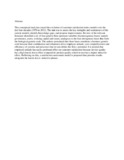| dc.contributor.author | Kibera, Francis | |
| dc.contributor.author | Kabare, Ndungu, | |
| dc.date.accessioned | 2015-03-10T08:21:46Z | |
| dc.date.available | 2015-03-10T08:21:46Z | |
| dc.date.issued | 2014 | |
| dc.identifier.citation | Kabare, Ndungu, and Kibera Francis. "A REVIEWOF CUSTOMER SATISFACTION MODELS AND A PROPOSED BUSINESS GENETIC CODE." European Scientific Journal 10.28 (2014). | en_US |
| dc.identifier.uri | http://www.eujournal.org/index.php/esj/article/view/4393 | |
| dc.identifier.uri | http://hdl.handle.net/11295/81085 | |
| dc.description.abstract | This conceptual study has traced the evolution of customer satisfaction index models over the last four decades (1970 to 2012). The aim was to assess the key strengths and weaknesses of the current models; identify knowledge gaps; and propose improvements. Review of the relevant literature identified a set of four generic firm upstream variables (businessgenous bases) namely governance, assets, working capital and teams, analogous to the four nitrogenous bases that form the biological genetic code. The authors postulated that these bases constitute a business genetic code because their combination and robustness drive employee attitude, cost competitiveness and efficiency of systems and processes that in turn define the firm’s potential. It is posited that employee attitude has such a profound effect on customer satisfaction because service quality has a high knock down effect compared to product quality which in turn has a higher inductive effect. Reflecting on this, a satisfaction assessment model is proposed that presents results alongside the knock down- inductive phases. | en_US |
| dc.language.iso | en | en_US |
| dc.title | A review of customer satisfaction models and a proposed business genetic code | en_US |
| dc.type | Article | en_US |
| dc.type.material | en | en_US |

